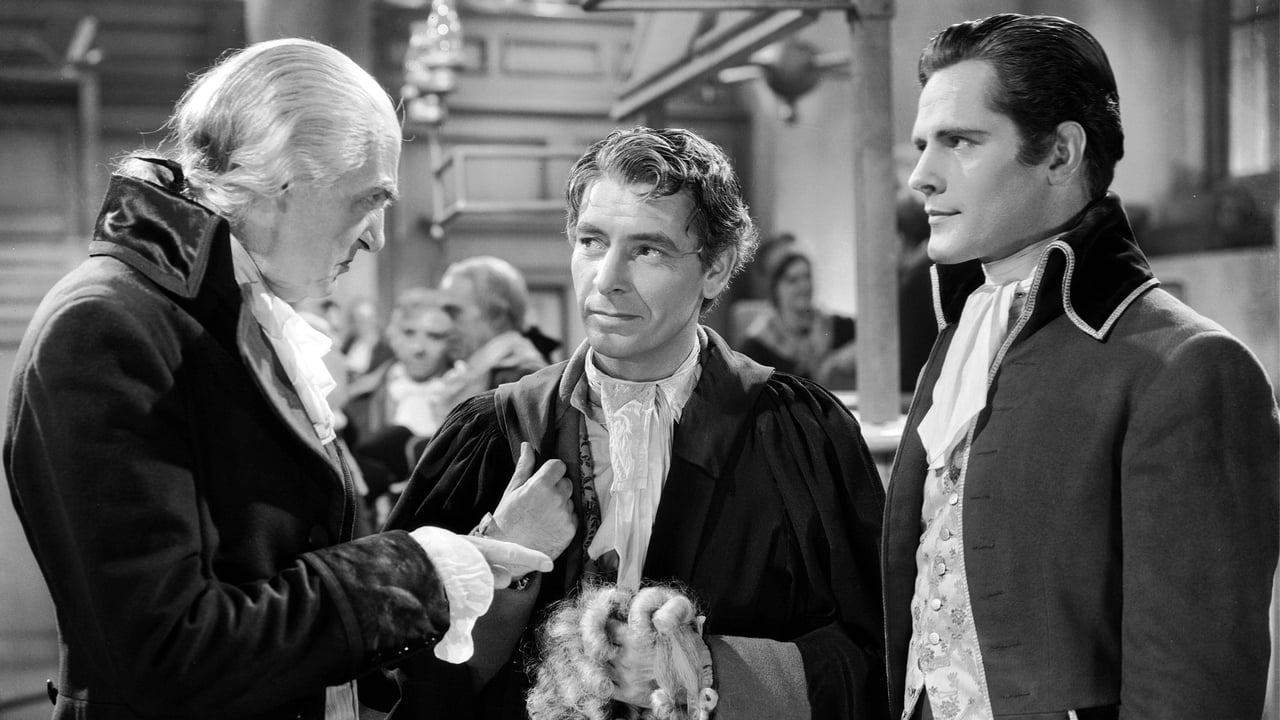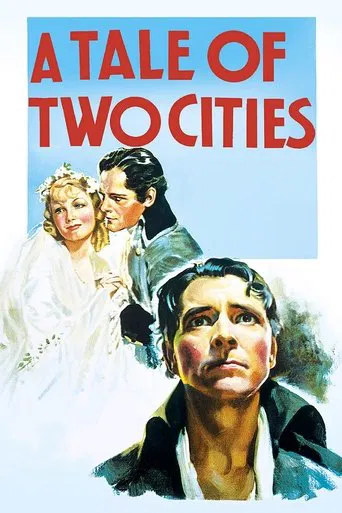

What makes it different from others?
... View MoreIt's funny watching the elements come together in this complicated scam. On one hand, the set-up isn't quite as complex as it seems, but there's an easy sense of fun in every exchange.
... View MoreOne of the best movies of the year! Incredible from the beginning to the end.
... View MoreLet me be very fair here, this is not the best movie in my opinion. But, this movie is fun, it has purpose and is very enjoyable to watch.
... View MoreJack Conway's "A Tale of Two Cities" is based on the popular Charles Dickens novel of the same name depicting the events of the French Revolution and happens to depict them very well, and thanks to how Conway directed this movie it is also one of the finest period pieces that I've ever seen. The movie stars Ronald Colman in a role he always felt that he was born to portray as Sydney Carton an alcoholic British lawyer who defends a young Frenchman named Charles Darnay (Donald Woods) who happens to be a relative to an aristocrat named Marquis St. Evremonde (Basil Rathbone) who he differs from in every way in terms of political philosophy, and all the poor French citizens who are victims of the reign of King Louis XVI and his wife Marie Antoinette, and as punishment they wanted to kill all of the aristocrats as well as all of their relatives all the way down to babies which is a very sickening idea thanks to clouded judgment. Carton is also defending him for the sake of his wife (Elizabeth Allan), daughter,her maid (Edna May Oliver) and the rest of her family of which he credits for sobering him up, and as a result he decides to sacrifice himself for the sake of his friends which is his plan for getting Darnay out of prison. Although Colman felt he was born to play the role of Sydney Carton he strongly refused to play the dual roles of Carton and Darnay which are supposed to be lookalikes in the story. Though I didn't read the novel I do know that the novel starts with the words "It was the best of times, it was the worst of times." which I couldn't think of any better words that Dickens wrote to best describe this story. The screenplay along with Conway's sure handed direction makes you relate to both the British and the French citizens but the problem with the French people is that they let their emotions get the best of themselves and they totally acted out of revenge towards aristocrats and racism towards British people. The performances are very good but Colman is so good in this role that he makes the role of Carton his own and was unfortunately snubbed for a best actor Oscar nomination probably due to the fact that his performance was far too good for the Academy, this is a great film that is hardly remembered anymore, and is one of the finest films that the year 1935 had to offer.
... View MoreAnother literary classic gets the Hollywood treatment . What this 1935 version of "A Tale of Two Cities" lacks in sophistication it certainly makes up for in vigor. Jack Conway directed, (though Val Lewton and Jacques Tourneur are credited with the handling of the crowd scenes, which are magnificent), and Ronald Colman is a splendid Sydney Carton doing a far, far better thing than he had ever done, The supporting cast are something of a mish-mash; Elizabeth Allan and Donald Woods are drips as Lucie and Charles Darnay but Edna May Oliver is terrific as Miss Pross and Blanche Yurka, a suitably terrifying Madame De Farge, knitting shrouds like there's no tomorrow which, of course, for many there wasn't. Subtle it isn't but even now it's still one of the most enjoyable epics of its period and vastly superior to the tepid British remake with Dirk Bogarde playing both Carton and Darnay.
... View MoreGood adaptation of Charles Dickens' classic novel.Set in Paris and London before and during the French Revolution, the story of how the Revolution, and the build-up to it, ultimately affects the lives of several people. One is a former French aristocrat, Charles Darnay (played by Donald Woods). Others include his father, wife, father-in-law and the French population in general.Entertaining, engaging and intriguing. Also examines reasonably well the causes for the Revolution, and the fascist, overreacting, overreaching consequences of it.Solid performances all round.Worth watching, at the very least in that this is quicker than reading the book...
... View MoreI hadn't seen this movie in almost 50 years - I saw it once when I was a kid on TV. So I decided to see it again, and I'm glad I did. Dickens was not an author of subtleties, and Tale of Two Cities isn't subtle. There are the oh-so good characters, like Lucie Manette, who is boring, and her father, Dr. Manette, who is only slightly less boring. There is the evil Marquis d'Evremond, who is thoroughly evil, but not at all boring, especially as brought to life by Basil Rathbone in one of his many great performances. There are the caricatural secondary characters, such as Miss Pross, also wonderfully brought to life by the indomitable Edna May Oliver.And there is weary Sydney Carton, who sees nothing to live for and so drinks his life away. Yet Carton occasionally glimpses what his life could have been, and then, for a few brief moments, there is real depth to him. Fortunately, in a very unevenly cast movie, Carton here gets played by Ronald Coleman. And Coleman here gives a performance such as you will never forget. Yes, there is his wonderful voice with all the modulations of tone to suggest every nuance. And a face to match. While the other characters are either boring or funny or horrifying (Mme de Farge), Carton in his performance becomes a moving individual. Why Coleman didn't get at least an Oscar nomination for the part I cannot explain. (Paul Muni won it that year for playing Pasteur, a great performance, and the other four nominees were all deserving, but since in those days the nominees were not limited to 5 as they are now and since Coleman's performance is certainly as good as Spencer Tracy's in San Francisco, I do not see how Coleman got left out.)There are other things to recommend the movie as well. The storming of the Bastille is powerfully filmed. The trial scenes are grotesque and probably exaggerated, but memorable. But Coleman as Carton is remarkable, and if you haven't seen it and you enjoy a great performance, this is one to treat yourself to. The last lines (It is a far, far better thing ..., etc.) have been caricatured many times, but when Coleman recites them you won't laugh. It's truly very moving - though of course a very conservative view of the French Revolution.-----------------------I just watched this again tonight after the passage of a few more years. I'm reading the novel now to see what changes MGM made. I could go on about those, and they are interesting, but I haven't got the space necessary. The major ones come near the end, when everyone goes back to Paris. The two trials of Darnay are collapsed into one in the movie, and the reading of Dr. Manette's letter, which is VERY long in the novel, is shifted to Mme de Farge, giving Blanche Yurka the acting opportunity of a lifetime as she recounts her past and sways the jury/mob to condemn Darnay. The movie never reveals that the cowardly and opportunistic Barsad is Pross's long-lost brother. Etc.Repeated viewing makes this movie look even better. As was often the case with epic movies in the 1930s, the smaller roles here are brilliantly realized. Claude Gillingwater, the Jarvis Lorry in this version, appears well down the cast list, though his is a major role. He does a superb and, when necessary, very understated job here. Isabel Jewell, by overplaying the Seamstress in the final scene, sets off Ronald Colman's performance, which is so deeply moving for being so controlled. Blanche Yurka and Edna May Oliver, though very different, are both first rate. Pross comes off as a lovable caricature, it's true, but Yurka makes Mme de Farge a very real study in hatred. Only the romantic leads, Donald Woods (Darnay) and Elizabeth Allan (Lucie), are uninteresting. I don't know why MGM used her in both this and David Copperfield. She is so bland.But this movie is not bland, not by a long shot. I can't recommend it too highly.
... View More